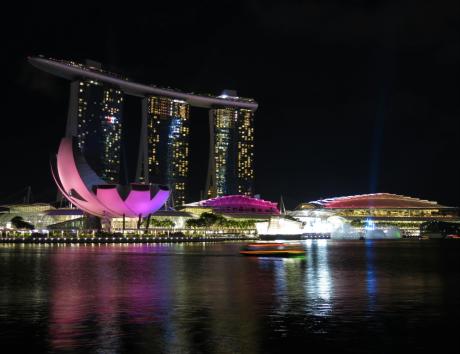Crafting a winning Singapore resume: Tips for success
It’s important to have a well-crafted resume when applying for jobs in Singapore, which has a culture that emphasizes hard work and formality in communication. A resume is your chance to make a good first impression and show hiring managers you have what it takes to get the job done. Learn the details you need to know to meet expectations for your Singapore resume so you can finally land the job you want.

Understanding the Singaporean job market
Before you begin writing your Singapore resume, you should understand the job market in Singapore. SkillsFuture, a job skills initiative launched by the government of Singapore, publishes a report on the most in-demand skills in the country’s job market (1). Identifying what skills employers are looking for in your sector will help you know which ones you should prioritize on your resume.
Additionally, it’s crucial that you understand the work culture in Singapore so you can reflect its values in your resume. Singaporean employers value professionalism and formality, so using formal language and sticking to standard resume formats will be key. Singaporeans also value group achievements, so try to include team wins on your resume alongside your personal ones.
Resume fundamentals in Singapore
Because respect and formality are pillars of work culture in Singapore, it’s best to choose a resume format that is more polished and traditional. Even if you are applying to work in a creative position such as graphic design, you may want to save your graphic resume ideas for another time.
When job hunting in Singapore, resume format is of the utmost importance, so using a standard layout like a reverse chronological format is always a good idea. You might also consider using another standard resume format that is common in the Singaporean job market, such as functional, combination, and targeted resumes (which focus on a specific industry or job).
When you write your resume for a job in Singapore, use clear and concise language and formatting. Avoid creative and modernized layouts that don’t follow standard formatting rules, and make sure to avoid the use of stylized fonts.
Additionally, make sure that you highlight your achievements and skills. This can be done in a summary section at the top of the resume, but you should also highlight your achievements in the bullet points below your job details.
Opt for high-impact action verbs that convey outcomes and results instead of vague or generic details about your job responsibilities, as this is what makes you stand out as a candidate amongst hundreds of other applicants for the same position.
Finally, you need to ensure that you have tailored your resume for each position you’re applying for. This means that everything that appears on your resume should be relevant to the industry and the job you want. Using industry-specific keywords that indicate you possess in-demand skills is always a good idea. This will pique the interest of recruiters and hiring managers who are looking for candidates of your caliber.
Expert Tip:
Tailoring your resume for success in Singapore
You know that you should tailor your resume and cover letter to specific job openings, but how do you accomplish this goal? The first step is to conduct in-depth research on the role and the employer. This helps you understand the norms, expectations, and culture of the company you want to work for so you can ensure those attributes shine through in your resume.
Researching the role helps you understand which skills and achievements will be most relevant to your resume. For example, someone applying for a business management role will likely need to show proficiency in applying the concept of continuous improvement for the processes and procedures they will be overseeing.
If you are changing industries and need to tailor your resume in a way that reflects the job you’re going after, consider using a Singapore resume format that puts your transferable skills front and center. This will help you avoid confusing the hiring manager and make it clear how your previous roles have prepared you for the position you want now.
If you’re unsure about the resume you’ve created, this is a great reason to consult expert resume articles for advice. These articles can help you understand how to format your resume, use impactful but professional language, and ensure you make a good impression on whoever receives it.
While you can hire a resume writer in Singapore to craft your perfect application, consider using a resume sample as a starting point to help you know which sections to include and how to structure your document. This will ensure that your resume comes across as polished and professional.
“It’s crucial that you understand the work culture in Singapore so you can reflect its values in your resume.”
Crafting your Singaporean resume
Here are some tips on creating the perfect application package to apply for jobs in Singapore.
Crafting a compelling career objective
Though many in the U.S. wonder if career objectives are still necessary, they are the norm for Singapore applications. Having this on your resume can attract more recruiters to you as a candidate.
To craft a compelling career objective, start with a personal trait, your job title, and your years of experience. Then, discuss your skills and any accomplishments that prove that you possess those skills. If desired, you can use the last sentence to convey your career intentions.
Note that your career objective should not be more than a few sentences. Its purpose is to hook the person reading it and draw them in so they want to keep reading. You’ll have more room to explain your achievements as you write your cover letter or tweak your job letter template.
Should you include a photo in a Singapore resume?
While including photos used to be standard practice, whether it’s still a good idea remains a hotly debated topic in Singapore. According to Singapore’s Ministry of Home Affairs, including a photograph is optional.
However, the government agency warns that photos usually aren’t read well by the ATS systems that most employers use (3). If you do choose to include a photograph, make sure it is recent and conveys professionalism.
How long should a Singapore resume be?
A Singapore resume should be kept concise. However, the actual length will vary according to the role and the level of seniority a candidate has reached.
Entry-level candidates should generally use a shorter Singapore resume template since they haven’t had as much time to build their careers and stack achievements. However, manager and C-level roles may have a resume that spans two to three pages, as this gives them room to include their longer work history.
Tips and best practices for writing a resume in Singapore
As you craft your Singaporean resume, here are a few things you need to consider and look out for:
- Consider using a resume template in Singapore’s competitive job market to help you stand out as a professional
- Prioritize your work history, skills, and achievements, placing your educational details and miscellaneous information toward the bottom of the document
- Comb the job description for keywords and skills the employer is looking for and incorporate them into your resume to help increase its relevance
- Include a list of two or three references with your resume, as this makes it easier for hiring managers to contact them
Keeping these tips and best practices in mind can help you put your best foot forward and stand out in the job market.
Creating a polished and professional resume is the key to success in your Singapore job hunt
To create a successful resume in Singapore, it’s important to ensure that your document reflects the formal and professional work culture in the country. Use a standard resume format (such as reverse chronological) and tailor it to each position by including only relevant details and incorporating keywords from the job description. This helps you highlight your qualifications.
When you’re looking for a job in Singapore, resume samples are a great place to start. Using resume and cover letter examples will ensure you have the right structure and language, and this will help get your resume noticed so you can land the job you want.
Sources:
(1) SkillsFuture: Skills Demand for the Future Economy
(2) Institute of Policy Studies: Switching From British to American English in Singapore — Issues and Implications
(3) Ministry of Home Affairs Career Transition Office: Resume Guide
Impress potential employers with your resume
Follow step-by-step professional guidance to create a polished resume in minutes.



